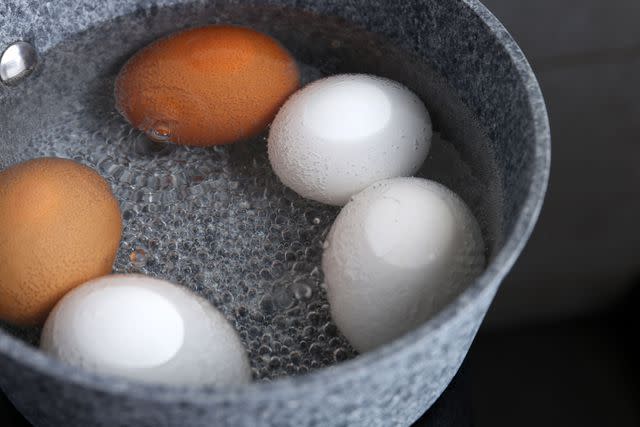Can I Eat My Hard-Boiled Easter Eggs?
You can get food poisoning from salmonella and other bacteria from Easter eggs — but there are ways to minimize the risk

Getty
Stock photo of hard-boiled Easter eggsEaster is over, and many families are left with an abundance of candy and hard-boiled eggs — usually dyed for egg hunts.
But while jelly beans and other seasonal treats may have a long shelf life, the same isn’t true for the eggs — even if they were hard-boiled. There is still a risk of food poisoning if the eggs have been mishandled.
The Food and Drug Administration recommends tossing any eggs that were left unrefrigerated for more than 2 hours — and if temperatures were above 90 degrees, they should be thrown away after one hour.
And specifically regarding Easter eggs, the FDA has a clear warning: “Do NOT eat them after hiding or playing with them. Bacteria and viruses picked up on the shells can be transferred to the edible part of the egg,” the agency says.

Getty
Sock image of hard-boiled eggHowever the USDA says that ‘found’ eggs can be eaten, although they "must be washed, re-refrigerated and eaten within 7 days of cooking." The total time for hiding and hunting eggs should not exceed 2 hours," the agency says.
The FDA outlines symptoms of foodborne illness. “Although most people will recover from a foodborne illness within a short period of time, some can develop chronic, severe, or even life-threatening health problems,” adding that people can have “vomiting, diarrhea, and abdominal pain” as well as “flu-like symptoms, such as fever, headache, and body ache.”
Related: The Best Tips and Tricks for Peeling Hard-Boiled Eggs
The biggest concern is Salmonella, which can be carried by chickens and other poultry. The CDC says the risk can be reduced by cooking the eggs until “both the yolk and the white are firm” — so if you slice into one of your Easter eggs, and the yolk is soft or undercooked, it’s a better bet to toss it.
“Most people who get sick from Salmonella have diarrhea, fever, vomiting, and stomach cramps. Symptoms usually begin 6 hours to 6 days after infection and last 4 to 7 days,” the CDC says, adding that while not everyone will need antibiotics, some with severe illness will need treatment.

Getty
Stock image of boiling eggsRelated: Death Toll Rises to 8 in Salmonella Outbreak Tied to Contaminated Cantaloupes and Cut Fruit
“Rarely, Salmonella can spread to the bloodstream and cause a life-threatening infection.”
The CDC estimates that the Salmonella bacteria causes 1.35 million infections, 26,500 hospitalizations, and 420 deaths in the United States every year.
Not sure if your hard-boiled eggs have gone bad before the recommended 7 days? As Real Simple says, if is slimy, smelly, or has a chalky taste, it’s time to toss it.
Never miss a story — sign up for PEOPLE's free daily newsletter to stay up-to-date on the best of what PEOPLE has to offer, from juicy celebrity news to compelling human interest stories.
For more People news, make sure to sign up for our newsletter!
Read the original article on People.
